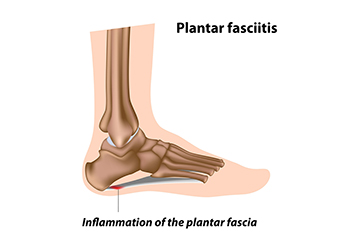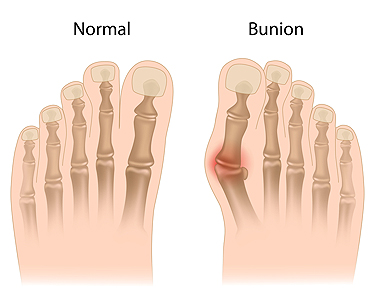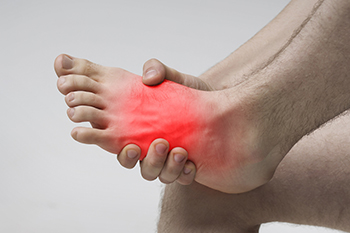Garner (919) 661-4150
September 2022
Treating Plantar Fasciitis

Plantar fasciitis is a common foot affliction and source of heel pain. The condition is caused by inflammation of the plantar fascia, which is a band of tissue running along the arch of the foot. There are many ways that a podiatrist might recommend treating plantar fasciitis. For example, more conservative treatment options might include performing stretches/exercises, wearing a foot splint, wearing arch supports, or taking anti-inflammatory drugs. In other cases, effective treatment options might include shock wave therapy, which utilizes sound waves to stimulate the plantar fascia. A cortisone injection might even be attempted once to address cases of plantar fasciitis. In more severe cases, a surgical procedure might help treat a case of plantar fasciitis. If you have this foot condition, contact a podiatrist today.
Plantar fasciitis can be very painful and inconvenient. If you are experiencing heel pain or symptoms of plantar fasciitis, contact Chukwuma Ukata, DPM from Advanced Carolina Foot and Ankle Center. Our doctor can provide the care you need to keep you pain-free and on your feet.
What Is Plantar Fasciitis?
Plantar fasciitis is the inflammation of the thick band of tissue that runs along the bottom of your foot, known as the plantar fascia, and causes mild to severe heel pain.
What Causes Plantar Fasciitis?
- Excessive running
- Non-supportive shoes
- Overpronation
- Repeated stretching and tearing of the plantar fascia
How Can It Be Treated?
- Conservative measures – anti-inflammatories, ice packs, stretching exercises, physical therapy, orthotic devices
- Shockwave therapy – sound waves are sent to the affected area to facilitate healing and are usually used for chronic cases of plantar fasciitis
- Surgery – usually only used as a last resort when all else fails. The plantar fascia can be surgically detached from the heel
While very treatable, plantar fasciitis is definitely not something that should be ignored. Especially in severe cases, speaking to your doctor right away is highly recommended to avoid complications and severe heel pain. Your podiatrist can work with you to provide the appropriate treatment options tailored to your condition.
If you have any questions please feel free to contact our office located in Garner, NC . We offer the newest diagnostic and treatment technologies for all your foot and ankle needs.
Surgery for Bunions

A bunion is a foot deformity that manifests itself as a bony bump near the joint of the big toe. Importantly, bunions might also form at the base of the pinky toe as well, which are known as bunionettes. If you have a bunion, you may experience any number of symptoms, including swelling at the affected joint, redness, and possibly pain. If you have a severe case of bunions that does not respond to other forms of treatment, undergoing a surgical procedure to treat your bunions may possibly be an option. Such a procedure typically requires up to six months of recovery time, and it is primarily concerned with reducing pain and bringing the metatarsophalangeal joint back into alignment. The different types of relevant surgical procedures are known as an osteotomy, arthrodesis, and exostectomy, among others. If you have bunions and think you may be a candidate for bunion surgery, contact a podiatrist today.
If you are suffering from bunions, contact Chukwuma Ukata, DPM of Advanced Carolina Foot and Ankle Center. Our doctor can provide the care you need to keep you pain-free and on your feet.
What Is a Bunion?
A bunion is formed of swollen tissue or an enlargement of boney growth, usually located at the base joint of the toe that connects to the foot. The swelling occurs due to the bones in the big toe shifting inward, which impacts the other toes of the foot. This causes the area around the base of the big toe to become inflamed and painful.
Why Do Bunions Form?
Genetics – Susceptibility to bunions are often hereditary
Stress on the feet – Poorly fitted and uncomfortable footwear that places stress on feet, such as heels, can worsen existing bunions
How Are Bunions Diagnosed?
Doctors often perform two tests – blood tests and x-rays – when trying to diagnose bunions, especially in the early stages of development. Blood tests help determine if the foot pain is being caused by something else, such as arthritis, while x-rays provide a clear picture of your bone structure to your doctor.
How Are Bunions Treated?
- Refrain from wearing heels or similar shoes that cause discomfort
- Select wider shoes that can provide more comfort and reduce pain
- Anti-inflammatory and pain management drugs
- Orthotics or foot inserts
- Surgery
If you have any questions, please feel free to contact our office located in Garner, NC . We offer the newest diagnostic and treatment technologies for all your foot care needs.
Arthritis Can Cause Pain in the Feet and Ankles
Handling Itchy Feet During Pregnancy

When a woman carries a baby to term during a pregnancy, she undergoes a litany of different bodily changes. Many of these changes can impact the feet. For example, during a pregnancy, a woman can experience sensations of itchiness on her feet. This itchiness can prove to be quite an annoyance for a pregnant woman, particularly during the nighttime when the sensations may interrupt sleep. Itchy feelings are primarily caused by hormonal skin changes. There are a number of steps that a pregnant woman can take to mitigate the itchiness. For instance, a woman can wear socks that have a loose fit and are made of breathable materials. In particular, socks that are made of cotton or even wool can fit this description. To soothe itchy feet, a pregnant woman can apply a good moisturizer on the feet. Additionally, giving the feet an oatmeal bath could help soothe itchiness. Lastly, massaging the feet could minimize itching sensations. Be sure to contact your podiatrist about these techniques and others to ensure that you are doing what is best for your own feet. If you are pregnant, contact a podiatrist today who can help you to maintain proper foot care.
Pregnant women with swollen feet can be treated with a variety of different methods that are readily available. For more information about other cures for swollen feet during pregnancy, consult with Chukwuma Ukata, DPM from Advanced Carolina Foot and Ankle Center. Our doctor will attend to all of your foot and ankle needs.
What Foot Problems Can Arise During Pregnancy?
One problem that can occur is overpronation, which occurs when the arch of the foot flattens and tends to roll inward. This can cause pain and discomfort in your heels while you’re walking or even just standing up, trying to support your baby.
Another problem is edema, or swelling in the extremities. This often affects the feet during pregnancy but tends to occur in the later stages.
How Can I Keep My Feet Healthy During Pregnancy?
- Wearing orthotics can provide extra support for the feet and help distribute weight evenly
- Minimize the amount of time spent walking barefoot
- Wear shoes with good arch support
- Wear shoes that allow for good circulation to the feet
- Elevate feet if you experience swelling
- Massage your feet
- Get regular, light exercise, such as walking, to promote blood circulation to the feet
If you have any questions please feel free to contact our office located in Garner, NC . We offer the newest diagnostic and treatment technologies for all your foot and ankle needs.
Facts About Cuboid Bone Fractures

A stress fracture of the cuboid bone is said to be more common among people who run and play sports like basketball, gymnastics, and ballet. The main symptom of a cuboid stress fracture is continually building pain on the top of the foot near the 4th and 5th metatarsals. A cuboid stress fracture is considered to be a repetitive overuse injury and may be difficult to detect. At first, pain is experienced during or directly after activity, but it often progresses to pain while at rest which is a sure sign of a stress fracture, experts say. This injury may be the result of rapid increases in training distance, duration, or intensity. Other considerations are nutrition, footwear, and medications. A proper diagnosis can be made through imaging tests, such as an MRI. Treatment usually starts with rest, ice, compression, and elevation, but may include wearing a cast or boot. Surgery may be needed in more severe cases. Bone healing typically takes six to ten weeks. For further information, please consult a podiatrist for a proper diagnosis.
Stress fractures occur when there is a tiny crack within a bone. To learn more, contact Chukwuma Ukata, DPM from Advanced Carolina Foot and Ankle Center. Our doctor can provide the care you need to keep you pain free and on your feet.
How Are They Caused?
Stress fractures are the result of repetitive force being placed on the bone. Since the lower leg and feet often carry most of the body’s weight, stress fractures are likely to occur in these areas. If you rush into a new exercise, you are more likely to develop a stress fracture since you are starting too much, too soon. Pain resulting from stress fractures may go unnoticed at first, however it may start to worsen over time.
Risk Factors
- Gender – They are more commonly found in women compared to men.
- Foot Problems – People with unusual arches in their feet are more likely to develop stress fractures.
- Certain Sports – Dancers, gymnasts, tennis players, runners, and basketball players are more likely to develop stress fractures.
- Lack of Nutrients – A lack of vitamin D and calcium may weaken the bones and make you more prone to stress fractures
- Weak Bones – Osteoporosis can weaken the bones therefore resulting in stress fractures
Stress fractures do not always heal properly, so it is important that you seek help from a podiatrist if you suspect you may have one. Ignoring your stress fracture may cause it to worsen, and you may develop chronic pain as well as additional fractures.
If you have any questions, please feel free to contact our office located in Garner, NC . We offer the newest diagnostic and treatment technologies for all your foot care needs.







